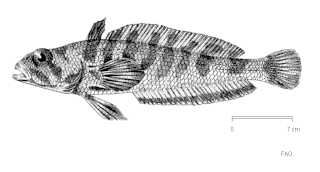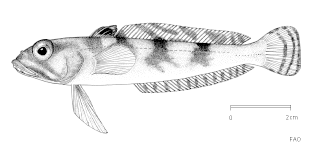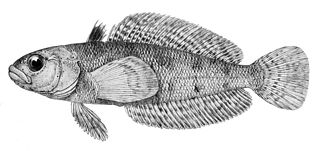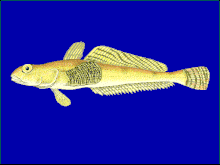
Nototheniidae, the notothens or cod icefishes, is a family of ray-finned fishes, part of the suborder Notothenioidei which is traditionally placed within the order Perciformes. They are largely found in the Southern Ocean.

The marbled rockcod is a species of marine ray-finned fish, belonging to the family Nototheniidae, the notothens or cod icefishes. It is native to the Southern Ocean, where it can be found at depths from 5 to 350 m. This is a commercially important species.
The bald notothen, also known as the bald rockcod, is a species of marine ray-finned fish belonging to the family Nototheniidae, the notothens or cod icefishes. It is native to the Southern Ocean.

Notothenia is a genus of marine ray-finned fishes belonging to the family Nototheniidae, the notothens or cod icefishes with the species in this genus often having the common name of rockcod. They are native to the Southern Ocean and other waters around Antarctica.

The painted notie, or painted notothen, is a species of marine ray-finned fish, belonging to the family Nototheniidae, the notothens or cod icefishes. It is native to the Southern Ocean.

The mackerel icefish is a benthopelagic species of fish found in the Southern Ocean and the southernmost waters of the Atlantic Ocean. They are mainly to be found near Heard and McDonald Islands, Îles Kerguelen and islands in the south Atlantic such as South Georgia and Bouvet Island. The species also inhabits the northern waters of the Antarctic Peninsula. They live at depths of 0–700 metres (0–2,297 ft), but are commonly found at depths of 30 to 250 metres.

Paranotothenia magellanica), also known as Magellanic rockcod, Maori cod, blue notothenia or orange throat notothen, is a species of marine ray-finned fish, belonging to the family Nototheniidae, the notothens or cod icefishes. It is native to the Southern Ocean. "Maori chief" and "black cod", sometimes used for this species, usually refer to fishes from the related genus Notothenia. Being a perciform fish, it is unrelated to the true cods of the order Gadiformes. This species is commercially important as a food fish.

The emerald rockcod, also known as the emerald notothen is a species of marine ray-finned fish belonging to the family Nototheniidae, the notothens or cod icefishes. It is native to the Southern Ocean where it is a commercially important species.

Trematomus is a genus of marine ray-finned fishes, belonging to the family Nototheniidae, the notothens or cod icefishes. These fishes occur in the Southern Ocean.

Gobionotothen is a genus of marine ray-finned fishes belonging to the family Nototheniidae, the notothens or cod icefishes. They are native to the Southern Ocean.

The grey rockcod, also known as the grey notothen, stripe-eyes notothen or stripe-eyed rockcod, is a species of marine ray-finned fish belonging to the family Nototheniidae, the notothens or cod icefishes. It is native to the Southern Ocean,The grey rockcod feed mainly on macrozooplankton and is of minor importance to commercial fisheries. It is the only species in the genus Lepidonotothen

Patagonotothen is a genus of marine ray-finned fishes, belonging to the family Nototheniidae, the notothens or cod icefishes. They are native to the southeast Pacific Ocean, southern Atlantic Ocean and the Southern Ocean.

Notothenia coriiceps, also known as the black rockcod, Antarctic yellowbelly rockcod, or Antarctic bullhead notothen, is a species of marine ray-finned fish, belonging to the family Nototheniidae, the notothens or cod icefishes. It is widely spread around the Antarctic continent. Like other Antarctic notothenioid fishes, N. coriiceps evolved in the stable, ice-cold environment of the Southern Ocean. It is not currently targeted by commercial fisheries.
Notothenia neglecta, the yellowbelly rockcod, is a species of marine ray-finned fish, belonging to the family Nototheniidae, the notothens or cod icefishes. It is found in the Southern Ocean in Antarctica. They are omnivorous, and are found in both benthic and pelagic regions of the ocean. Their diet includes krill, bivalves, and gastropods. They have evolved unique behaviors and morphological features in order to thrive in the cold and harsh Antarctic climate. N. neglecta is also commercially fished, although not in high numbers.

Lindbergichthys nudifrons, the yellowfin rockcod, also known as the yellow notie or the gaudy notothen, is a species of marine ray-finned fish, belonging to the family Nototheniidae, the notothens or cod icefishes. It is native to the Atlantic sector of the Southern Ocean.

Patagonotothen guntheri, the yellowfin notothen, is a species of notothen found in the Argentinian region of Patagonia, the Falkland Islands, the Burdwood Bank and the Shag Rocks west of South Georgia on the continental shelf at depths of 120-250 m, but may be found in waters deeper than 250 m in the Argentinian region.

Gobionotothen marionensis, the lobe-lip notothen, is a species of marine ray-finned fish belonging to the family Nototheniidae, the notothens or cod icefishes. It is native to the South Georgia and the South Sandwich Islands in the Atlantic Ocean, and the Crozet and Prince Edward Islands in the Indian Ocean.>
Gobionotothen acuta, the triangular rockcod or the triangular notothen, is a species of marine ray-finned fish belonging to the family Nototheniidae, the notothens or cod icefishes. It is native to the French Southern and Antarctic Lands, the Heard Islands and the Kerguelen Plateau in the Southern Ocean.

Notothenia cyanobrancha, the blue rockcod, bluegillnotothen, or bluegill rockcod, is a species of marine ray-finned fish, belonging to the family Nototheniidae, the notothens or cod icefishes. It is native to the Kerguelen and Heard Islands in the Southern Ocean.

The stocky rockcod, also known as the bandtail notothen, is a species of marine ray-finned fish belonging to the family Nototheniidae, the notothens or cod icefishes. It is found in the Southern Ocean.

















